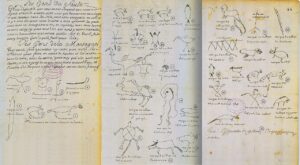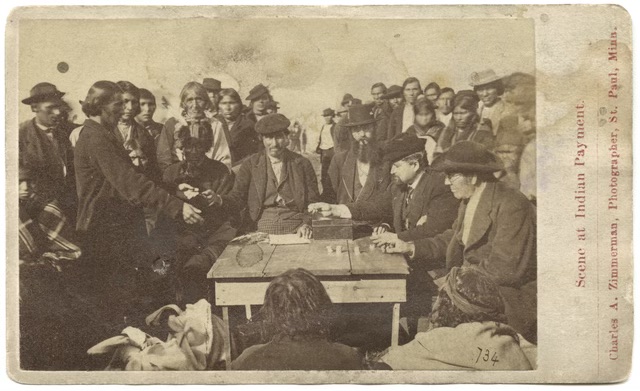Izhi-onaakonidi’ing (Where We Decide With Each Other) – Council Meeting
This set of words is for any group of Ojibwe-speaking people meeting together to make decisions. It was requested by the tribal council of Gichi-Onigaming: The Lake Superior Band of Chippewa who are working toward using more Ojibwemowin in their nation. Many groups, including sovereign nations, use common meeting formats to work within their own and with other nations’ governments. While Robert’s Rules of Order were created in America by a former Army captain in the early 1800s, they were based on systems of democracy that date back to the earliest gatherings of humans. In the United States, it is a well-documented fact that the Iroquois Confederacy inspired George Washington, Thomas Jefferson, Benjamin Franklin, and other founders as they wrote the Constitution.
In the Great Lakes region, the Confederacy of the Three Fires worked together as a large group and in small local communities, to “onaakonige” (to make decisions) using the language broadly referred to as Anishinaabemowin and locally spoken as Ojibwe, Odawa, and Potawatomi.
The Ogimaag (leaders) of Ojibwe nations have a long history of clan systems and structures which are at the core of traditional governance and could be the basis of constitutional revision. Today over 140 Anishinaabe sovereign nations are recognized by the U.S. and Canadian governments. In the U.S. they conduct legislative business based on their individual constitutions. In Canada they pass Band Council Resolutions in relation to the Indian Act which serves as their constitution.
Using Anishinaabemowin instead of English allows people to access the full range of beliefs and behaviors connected to the concept of mino-bimaadizi (the act of living well). For example, the words “onaakonige” and “inaakonige” can encompass many nuances of understanding as they move through the four types of verbs – those that happen inherently, those that are done by someone or a group, and those that are based on a relationship with something or someone. As these actions become final they can even become nouns while still retaining clear connections to the act of making the decision.
- Onaakonigaade – it has been decided
- Inaakonigaade – something specific has been decided
- Onaakonige – the act of someone making a decision
- Inaakonige – the act of someone making a specific decision
- Onaakonan – someone making a decision about something
- Inaakonan – someone making a specific decision about something
- Onaakon – someone making a decision about someone
- Inaakon – someone making a specific decision about someone
- Onaakonigewin – a decison
- Inaakonigewin – a specific decision
Awenen gidayaamin (Who is Present)
- Ogimaa – Chair
- Wezhibii’iged – Writer / Secretary
- Zhooniyaawegindang – Treasurer
- Dezhindangig – Ones who are discussing
- Wenaakonangig – Ones who are deciding
Gegoon gida-gikendaamin (Things we should all know) – Guiding Principles
Gakina awiiya gida-manaadendimin omaa.
We should all respect each other here.
Da-wenda-nisidawendagwad gakina awiiya de-gagiigidod endaso jibwaa awiiya gagiigidod ako-niizhing.
Everyone has the right to participate in discussion if they wish, before anyone may speak a second time.
Gakina awiiya da-gikendaan gakina ezhiwebag apane.
Everyone has the right to know what is going on at all times.
Mii eta zezikaa gichi-inendagwadoon daa wenji-wanishkwemigooyang.
Only urgent matters may interrupt a speaker.
Be-bezhigwan inendagwag da-dazhindaagwag.
Only one thing (motion) can be discussed at a time.
Gidezhichigemin (What we do)
Dazhindaagwadoon (Agenda items are discussed)
Gaawiin gimbezhingwendanziinmin.
We do not agree.
Nawaj da-waawiindamaagoyang.
We need more information.
Inendamowinike (Making a motion)
Nimisawendaan ge- . . . (insert your specific motion here).
I want the following – I move that …
Nimbezhigwendaan.
I am in agreement; I second the motion.
Inaakonibii’igaade (Recording a specific decision; Voting)
Awenen bezhigwendang?
Who is in favor?
- Enh / Enya – Yes
- (agindaasowin) ogii-bezhigwendaanaawaa. – (number) who agree.
Awenen bwaa-bezhigwendang?
Who is not in favor?
- Gaawiin – No
- (agindaasowin) gaawiin ogii-bezhigwendanziinaawaa. – (number) who do not agree.
Awenen bwaa-inaakonang?
Who abstains?
- Niin – I
- (nozwin) gaawiin de-inaakonanziin. – (name or names) do not decide this.
Ishkwaa-Inaakonigewinike (Making a final specific decision; Making a resolution)
Inaakonigaade . . . It (insert your resolution language) has been decided.
Bebaamendang . . . To Whom It May Concern . . .
Izhi-inaakonidi’ing Debendaagozid Nozwin (policy council member name).
Ishkwaataawinan (Stops; Taking a recess)
Gidaa-ishkwaataamin ako (agindaasowin) dibaaganensan izhiseg.
We should stop as (number) minutes pass. We’ll break for __ minutes.
Ozhibii’igaade waa-ge-maawanji’idiyang (Recording the next meeting location)
Giwii-maawanji’idimin (giizis) (giizhigad agindaasowin) (dibaaganed) (ate).
We will meet (month) (day number) (time) and (location).
Giwii-dazhindaamin (Common Agenda Items)
- Zhooniyaakewin – Financial Update
- Giwii-diba’amawaanaanig daa-diba’amawangidwaa – Payments for Approval
Anooj Atenoon (Locations in the Community)
- Mitigo-maawanji’idiwigamig – log building
- Oshki-maawanji’idiwigamig– community center
- Gichi-ogimaawigamig – council building
References
- The Alliance of the Three Fires in Trade and War, 1630-1812. Donald L. Fixico. Michigan Historical Review, Vol. 20, No. 2, American Indians (Fall, 1994), pp. 1-23.
- Centering Anishinaabeg Studies: Understanding The World Through Stories. Jill Doerfler and Niiganwewidam James Sinclair and Heidi Kiiwetinepinesiik Stark. East Lansing: University Of Michigan Press. 2013.
- Ogimaag : Anishinaabeg Leadership, 1760-1845. Cary Miller. University of Nebraska Press, 2010.
- Respect, Responsibility, and Renewal: The Foundations of Anishinaabe Treaty Making with the United States and Canada.” Stark, Heidi Kiiwetinepinesiik. American Indian Culture and Research Journal, vol. 34, no. 2, 2010, pp. 145–64.
- Law’s Indigenous Ethics. John Borrows. University of Toronto Press, 2019.
- The Iroquois League, the Articles of Confederation, and the Constitution. Samuel B. Payne, Jr. The William and Mary Quarterly, Vol. 53, No. 3, Indians and Others in Early America (Jul., 1996), pp. 605-620.
- Map of the Three Fires Confederacy today: https://ojibwe.net/inawe-mazinaigan-map-project/
- A review of Robert’s Rules: https://assembly.cornell.edu/sites/default/files/roberts_rules_simplified.pdf



